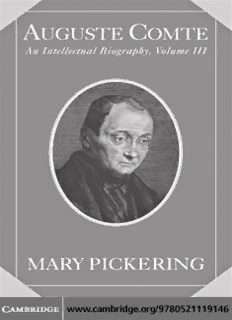
Auguste Comte: An Intellectual Biography PDF
Preview Auguste Comte: An Intellectual Biography
This page intentionally left blank This volume continues to explore the life and works of Auguste Comte during his so-called second career. It covers the period from the coup d’e´tat of Louis Napoleon in late 1851 to Comte’s death in 1857.DuringtheseearlyyearsoftheSecondEmpire,Comtebecame increasingly conservative and anxious to control his disciples. This study offers the first analysis of the tensions within his movement. Focusing on his second masterpiece, the Syste`me de politique posi- tive, and other important books, such as the Synthe`se subjective, Mary Pickering not only sheds light on Comte’s intellectual development but also traces the dissemination of positivism and the Religion of Humanity throughout many parts of the world. Mary Pickering is Professor of History at San Jose´ State University. The author of Auguste Comte: An Intellectual Biography, Volumes I, II, and III, she has published in Journal of the History of Ideas, Journal of Women’s History, Historical Reflections, Revue philosophique, andRevue internationale de philosophie. Auguste Comte AUGUSTE COM TE An Intellectual Biography, Volume III mary pickering San Jose´ State University CAMBRIDGE UNIVERSITY PRESS Cambridge, New York, Melbourne, Madrid, Cape Town, Singapore, São Paulo, Delhi, Dubai, Tokyo Cambridge University Press The Edinburgh Building, Cambridge CB2 8RU, UK Published in the United States of America by Cambridge University Press, New York www.cambridge.org Information on this title: www.cambridge.org/9780521119146 © Mary Pickering 2009 This publication is in copyright. Subject to statutory exception and to the provision of relevant collective licensing agreements, no reproduction of any part may take place without the written permission of Cambridge University Press. First published in print format 2009 ISBN-13 978-0-511-60505-5 eBook (NetLibrary) ISBN-13 978-0-521-11914-6 Hardback Cambridge University Press has no responsibility for the persistence or accuracy of urls for external or third-party internet websites referred to in this publication, and does not guarantee that any content on such websites is, or will remain, accurate or appropriate. Information regarding prices, travel timetables, and other factual information given in this work are correct at the time of first printing, but Cambridge University Press does not guarantee the accuracy of such information thereafter. To Nicolas, Natalia, and Michael
Description: